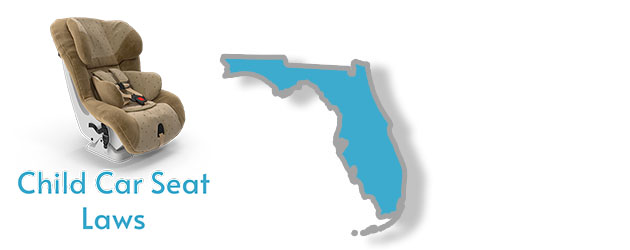A Summary of Child Car Seat Laws in Florida
What are the Height and Weight Requirements for Car Seats in Florida?

Children younger than 4 years are required by law to ride on a child restraint device whether inbuilt or on a separate carrier.
Florida car seat laws do not issue guidelines for rear-facing and forward-facing seats.
Children ages 4 and 5 are allowed to use a booster seat.
Florida allows children to sit in the front seat once they reach 6 years (Although this is not recommended until a child reaches the appropriate height to do so safely)
What are the Rear Facing Car Seat Laws in Florida?

Florida law requires children ages 0-3 to sit on child restraint devices of a separate carrier or a car’s inbuilt child-safety seat. The law does not cover rear-facing seat requirements, however, the Florida Department of Highway Safety and Motor Vehicles says the best car seat should fit your child perfectly.
The state encourages parents to follow AAP (American Academy of Pediatrics) guidelines. The guidelines recommend children should use a rear-facing seat until they are at least 2 years old or until they exceed the car seat manufacturer’s height and weight limits. The maximum weight for most seats is at least 20 pounds, although some manufacturers are now making seats that can support infants of up to 40 pounds. This means some children may use a rear-facing seat until age 4, which is still recommended by AAP.
What are the Forward Facing Car Seat Laws in Florida?

Florida does not address specifications for forward-facing seats. This means parents may be confused when trying to comply with forward-facing car seat laws. However, AAP and the car seat manufacturer’s manual outline specifics which can help you keep your baby safe while complying with the law. AAP recommends children to transition to a forward-facing seat once they weigh at least 20 pounds and are at least 2 years old. The seat must be federally approved and secured in the back seat away from an active airbag. Additionally, children should remain in this seat as long as they are within the manufacturer’s limits.
What are the Booster Seat Laws in Florida?

Florida requires booster seats for children who are aged 4 to 5. Unfortunately, this is not in line with best practices for child safety. Typically, children are ready for booster seats when they weigh at least 40 pounds and are older than 5 years. For a safe fit, the shoulder belt should cross the center of your child’s chest (not neck) and the lap belt should lie low across the upper thighs. Additionally, the seat must meet the federal safety standards and be secured in the back seat. Once your child is 4’9’’ or taller, he or she can now transition to a regular car seat belt.
When can a Child Ride in the Front Seat in Florida?

Florida allows children to sit in the front seat once they are 6 years or older. However, this is highly discouraged because children are too small for regular seat belts at this age. Regular car seat belts were designed to fit people with a height of 4’9’’ or more, so children wearing them may be exposed to serious injury in case of an accident due to oversize seat belts. If the shoulder belts and lap belts are wrongly positioned across the child’s body, serious damage to the spleen, intestines and spine may occur due to the forces exerted on the child during a car crash. Most experts recommend children should start wearing seat belts at age 8 as long as they have a height of 4’9’’.
Is it Illegal to Leave a Child Alone in a Vehicle in Floria?
Parents are not allowed to leave their children in a car for more than 15 minutes if the engine is not running. If the car is turned on, leaving the child unsupervised for any amount of time is against the law. We do not recommend leaving your child alone in the car for any amount of time.
Are Car Seats Required in Taxis in Florida?

Florida has one of the clearest laws applied to chauffeur-driven vehicles. Taxis, Limos, Sedans, Vans, Busses, and Motor Coaches are all exempt from car seat laws. The caveat for this exclusion is that the vehicle must be hired and used for the transportation of persons for compensations. So to qualify for this exemption the driver must be paid.
Note – It is not recommended to travel without using the proper child restraints.
More Florida Laws
- Florida Car Seat Laws
- Florida Child Support Laws
- Florida Dog Bite Laws: Complete Guide for 2026
- Florida Hit and Run Laws (2026 Guide)
- Florida Lemon Law: Complete Guide for 2026
- Florida Recording Laws (2026 Guide)
- Florida Sexting Laws (2026 Guide)
- Florida Statute of Limitations
- Florida Whistleblower Laws
- Murder Sentencing Guidelines – Minimum to Maximum for Every State (2026)
